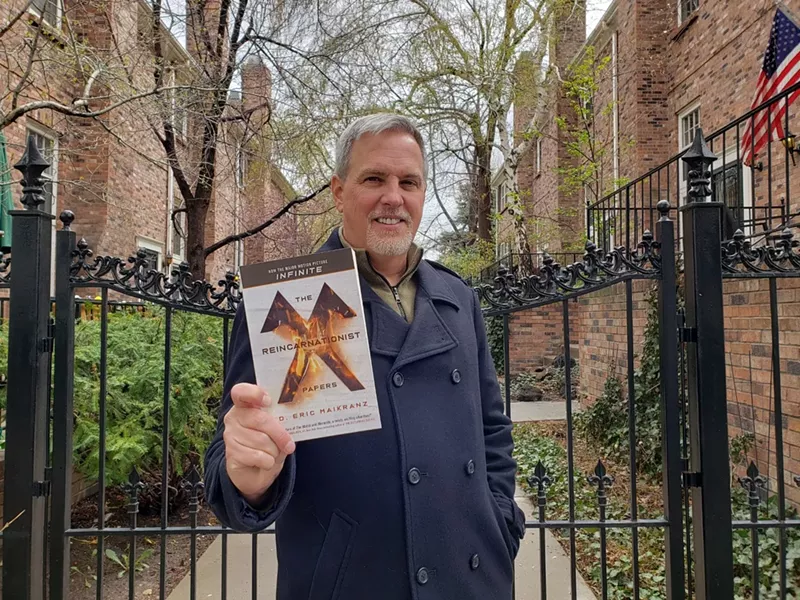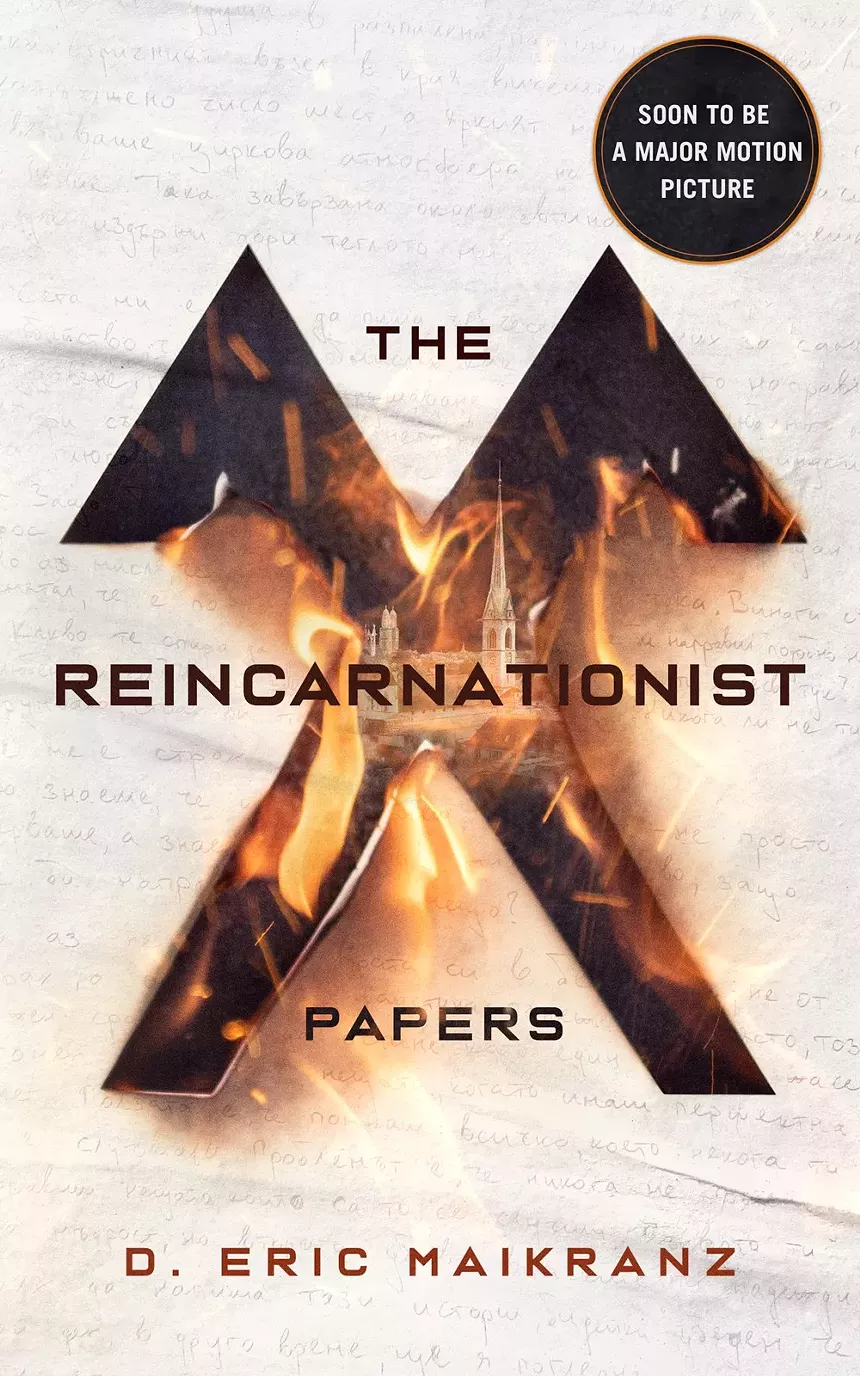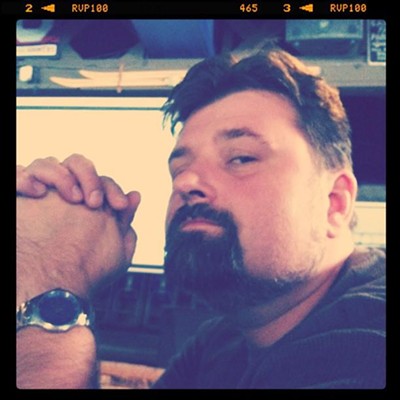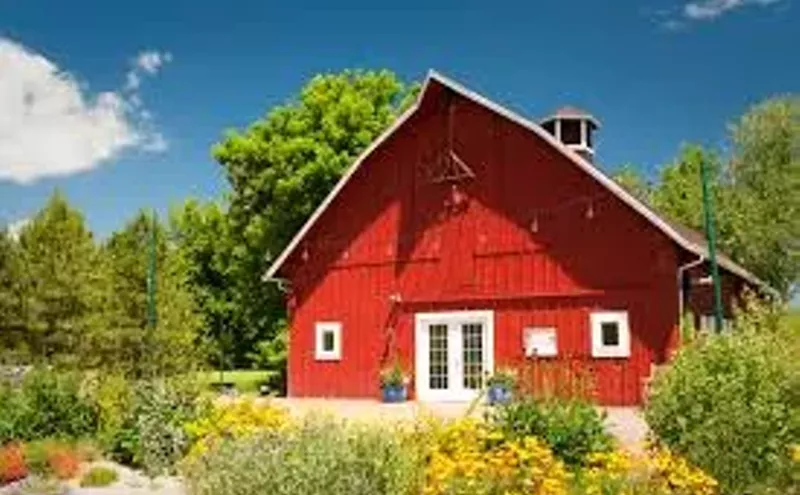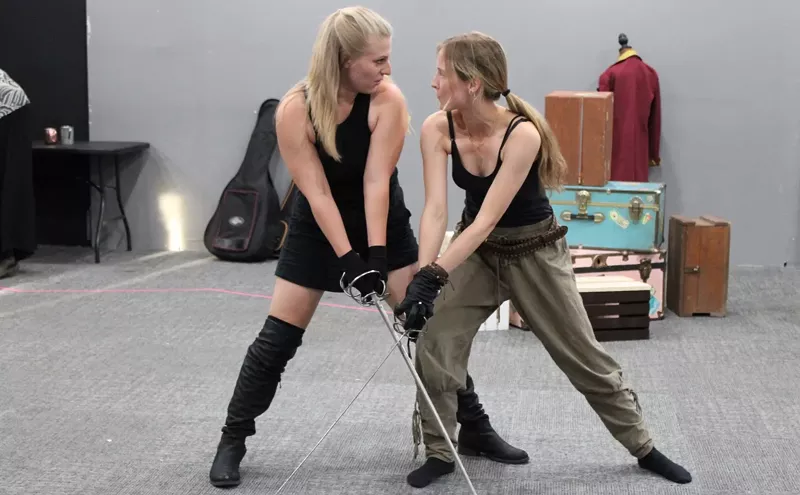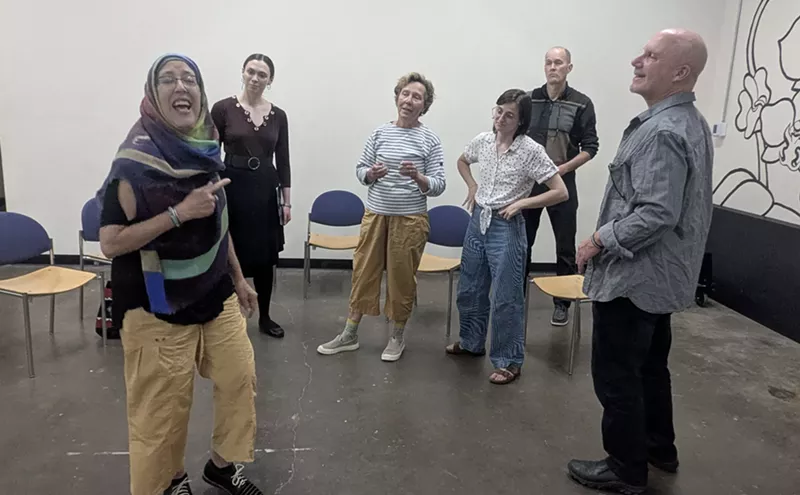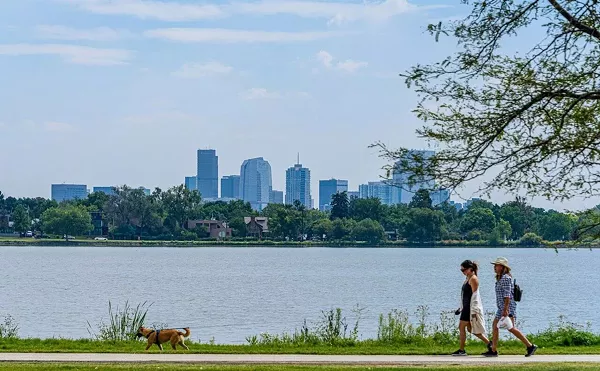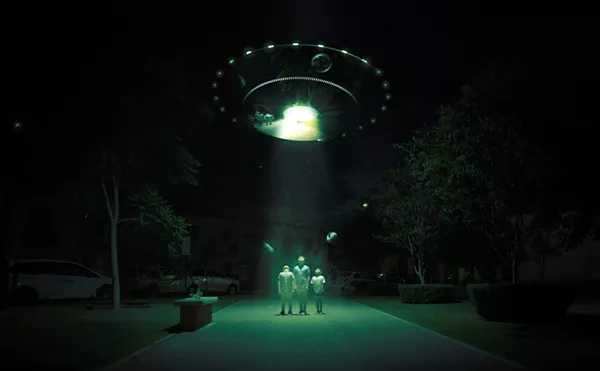Denver author D. Eric Maikranz is living the dream — actually, at least two of them. The first was having his debut novel, The Reincarnationist Papers, see print. That happened back in 2009, and the book's still available today. The second is the writer’s version of hitting the daily double: having that book not only be picked up for film, but actually released. The resulting movie, titled Infinite, is now streaming on Paramount Plus.
It’s been a remarkable ride for Maikranz. The novel was originally self-published, and Maikranz offered a reward to anyone who could get the book sold as a movie adaptation. As the story goes, a junior exec at a production company found a copy at a hostel in Nepal, and got the book optioned…and got the reward, too. The book is a dark fantasy with philosophical roots, recommended by Publisher’s Weekly, the Library Journal and no less than Oprah herself.
We spoke with Maikranz about his Cinderella-story novel, its adaptation to film, and how memories not his own brought about the whole thing.
Westword: The Reincarnationist Papers is out as a big-budget action flick called Infinite. How does it feel to see your book come to life like that?
D. Eric Maikranz: It’s a combination of emotions, but mostly excitement and gratitude. For sure I was excited to go on set and see parts of the movie being shot, and I can’t wait to see what director Antoine Fuqua will do in the movie. I feel grateful for all the help I received along the way, and to the entertainment professionals in Hollywood who chose this project to invest their time, artistic energy and capital into.
What was the process like, getting from book to film? It took over ten years to happen, so it must have been fraught with hiccups. Or is that just how long it usually takes?
The process is slow, and I was warned at the very beginning that it takes a while. Ten years is at the long end of what is normal, but it’s not unusual. I was also warned by the first producer and executive producer who optioned The Reincarnationist Papers that the odds were very slim that optioned novels actually make it all the way to shooting a movie, and that I should ready myself for "hiccups." And, boy, were there hiccups: The head of the studio left right after they bought it, and the project got shelved. Then the first lead actor, Chris Evans, pulled out, and the project looked doomed. Then Mark Wahlberg stepped in, and the movie is on again. Two Covid-19 delays didn’t help my nerves, either.
The upcoming film has some big names attached. You mentioned Mark Wahlberg, but also Chiwetel Ejiofor, Sophie Cookson, Jason Mantzoukas and many more. Did you have any input into casting? How do the actors chosen for the roles differ from what you imagined in the writing?
Yes, there are some big names attached to the movie. The cast also includes Dylan O’Brien, Rupert Friend and Toby Jones. I did not have any input into casting, but even if I had, I wouldn’t have been able to improve on what Paramount has done. I imagined Tom Hardy or Ryan Gosling in the lead, but I never imagined that Wahlberg would play the role.
Let's get back to the 2009 book. How did the idea for the novel come about?
The idea for the book came from three different catalysts. The first was the age-old saying "If I only knew then what I know now." Most of us have fantasized about having the wisdom of experience in a younger body. I just took that idea to the extreme by having these characters reincarnate and retain all the skills, experiences and lessons learned in new bodies — lifetime after lifetime.
The second was the idea that most of us end up being different people in different times in our lives, like being a child, a student, a worker, a parent or a grandparent. My reincarnating characters have the benefit of being able to accumulate skills, experiences and wealth and leave those assets for themselves in a future life, but we are like that, too, in that our work as students is like an intellectual inheritance that we leave to ourselves when we need it for our work or to raise a child. I keep going back to a Fredrick H. Hedge quote I keep on my desk as I write the books in The Reincarnationist Papers series: “Every man is his own ancestor and every man his own heir. He devises his own future and he inherits his own past.”
The third is that I have three very short memories that do not belong to me. They pre-date me and don’t fit with my life, but they are as real as any other memories I have. These three memory shards catalyzed me to think:
"What would it be like if you could remember everything from a previous life? What would that be like? Would it be a blessing or a curse?"
That’s fascinating. Willing to share these memories that aren’t yours?
The first one feels like the oldest one, historically speaking. I am a boy holding a taller man's hand. The taller man could be my father, or he could be a grandfather. He is taking me to the grand opening of a railroad roundhouse. The time period feels like 1870s or 1880s. All the tracks that lead to the center of the roundhouse are filled with black and brass steam locomotives that are whistling and belching smoke as we approach. I am excited — the same excitement you see in boys today around trucks or construction equipment. I go and see each steam locomotive in turn until the grand-opening ceremony starts, with men in tuxedos giving speeches. And then the memory ends.
The second one feels like it happens after the first one, but perhaps in a different life. I am a boy again, and I am playing in a barn filled with hay, but it is not an American-style barn. It looks more like the barns you see in the Austrian or Swiss Alps. Bigger, wider and longer with long openings on the sides. I am playing with two other boys and one girl that are about my same age. I stop the game we are playing to marvel at how golden the sunlight looks as it slants into the barn through one of the long openings in the wood on the sides. I am bathed in warm golden light, and I hear the laughs of my playmates, and the memory is over.
The third one feels like it happens sometime in World War II in Europe. Again, I am a boy, and I am walking along a muddy dirt road in the winter, and a light snow is falling. We are walking away from a village, away from our home. Traveling in the opposite direction on the road is an armored column or military convoy filled with trucks and troop transports towing wheeled artillery pieces. I cannot see any marking or insignia on the military convoy, and I can see no color, as the sky is gray and the light is flat, making everything look drab. My mood and the mood of the people walking with me is one of despair and loss. I am exhausted, and I struggle to keep up even though the others are carrying their possessions and I carry nothing — and then the memory is over.
That's it. Those are the three shards of memories that I have that are as clear as any memories I have from this life.
The secret-society angle of the book is another captivating element. Everyone loves a good secret cabal yarn.
I know, right? We all love a good conspiracy theory, and secret societies are just fascinating to us by nature. I was drawn to that idea, but once I started exploring these characters who reincarnate and who remember everything from their past lives, it became obvious very quickly that they would have much more in common with others like themselves than with the rest of "normal" humanity — hence why they formed a society that allows them to associate with each other over the centuries and stay together to work on things over longer, multi-life timelines. The more I researched about [real and imagined] secret societies, the more I leaned into that part of the story. When we’re on the outside looking in, it’s always like, "Hey, what’s going on in there?"
The book is fast-moving, but like The Matrix, there's a good amount of philosophical underpinning, and no small amount of history, as well. What's it like to keep all those plates spinning?
Thank you for noticing and appreciating that. Yes, it would have been a two-dimensional book if I had not taken the time to examine the existential questions of life, meaning morality and religion in this world where reincarnation is real for some people. The historical flashback chapters were the most fun to write, and the fact that these characters live and exist over centuries gave me a wide historical canvas to place them in to develop them over a longer timeline. I keep a lot of notes, and I write a lot of drafts to pull it all together.
The research for this book must have taken a significant amount of time, too, yes?
Yes. There was a ton of research, some of which I hint at in the footnotes. I wanted to make sure that I honored the history that I used in the flashback chapters by making it as accurate as possible. As a reader, I hate it when a story falls apart because of some preventable error in research, and I want my readers to be able to trust the story.
You live in Colorado these days, but you've had something of a vagabond past. What brought you to Colorado?
I live in central Denver now, but with the exception of two years in Rome, I have lived in Capitol Hill and the Washington Park area since 1986. I have Denver roots back to gems from the past like Rock Island, Muddy’s, City Spirit and the Market. I came to Colorado from northern New Mexico to work as an industrial welder before enrolling at CU.
What makes you stay?
I heard a saying when I first came here: “People come to Denver to make money, but they can never make enough to leave.” I think that was true.
Maikranz’s novel, The Reincarnationist Papers, is available at local bookstores and is already available to watch on Paramount Plus. For more on the film’s release, visit Maikranz’s website.

Audio By Carbonatix
[
{
"name": "GPT - Billboard - Slot Inline - Content - Labeled - No Desktop",
"component": "23668565",
"insertPoint": "2",
"requiredCountToDisplay": "2"
},{
"name": "STN Player - Float - Mobile Only ",
"component": "23853568",
"insertPoint": "2",
"requiredCountToDisplay": "2"
},{
"name": "Editor Picks",
"component": "17242653",
"insertPoint": "4",
"requiredCountToDisplay": "1"
},{
"name": "Inline Links",
"component": "18838239",
"insertPoint": "8th",
"startingPoint": 8,
"requiredCountToDisplay": "7",
"maxInsertions": 25
},{
"name": "GPT - 2x Rectangles Desktop, Tower on Mobile - Labeled",
"component": "24956856",
"insertPoint": "8th",
"startingPoint": 8,
"requiredCountToDisplay": "7",
"maxInsertions": 25
},{
"name": "Inline Links",
"component": "18838239",
"insertPoint": "8th",
"startingPoint": 12,
"requiredCountToDisplay": "11",
"maxInsertions": 25
},{
"name": "GPT - Leaderboard to Tower - Slot Auto-select - Labeled",
"component": "17676724",
"insertPoint": "8th",
"startingPoint": 12,
"requiredCountToDisplay": "11",
"maxInsertions": 25
}
]

